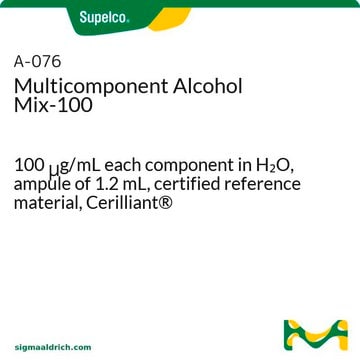E-030
Ethanol-80
80 mg/dL in H2O, ampule of 10 × 1.2 mL, certified reference material, Cerilliant®
Synonym(s):
Ethanol solution, Ethyl alcohol
About This Item
Recommended Products
grade
certified reference material
Quality Level
form
liquid
packaging
ampule of 10 × 1.2 mL
manufacturer/tradename
Cerilliant®
concentration
80 mg/dL in H2O
technique(s)
gas chromatography (GC): suitable
liquid chromatography (LC): suitable
application(s)
forensics and toxicology
format
single component solution
storage temp.
2-8°C
SMILES string
CCO
InChI
1S/C2H6O/c1-2-3/h3H,2H2,1H3
InChI key
LFQSCWFLJHTTHZ-UHFFFAOYSA-N
Looking for similar products? Visit Product Comparison Guide
General description
Application
- Analysis of ethanol content by proton nuclear magnetic resonance (1H NMR) spectroscopy in whole blood samples
- Development of a paper-based biosensor for directly measuring ethanol content in whole blood based on enzymatic colorimetric assessment combined with in-situ headspace gas separation
- Detection and quantitative analysis of ethanol and other volatile organic compounds (VOCs) in bovine blood samples by gas chromatography coupled to vacuum ultraviolet spectroscopy (GC-VUV)
- Development and validation of an analytical method based on head space-gas chromatography (HS-GC) combined with flame ionization detector (FID) to quantify ethanol in blood samples
Features and Benefits
- Fully characterized under ISO/IEC 17025 and ISO 17034 accreditation
- Accompanied with a comprehensive Certificate of Analysis (CoA) with data on stability, homogeneity, accuracy of concentration, uncertainty, and traceability
- Rigorously tested through real-time stability studies to ensure accuracy and shelf life
- Gravimetrically prepared using qualified precision balances to ensure minimal uncertainty
- Flame sealed under argon into ampoules for long-term shelf life
- Offered in a convenient, DEA-exempt format to improve laboratory efficiency
Legal Information
related product
Storage Class Code
12 - Non Combustible Liquids
WGK
nwg
Flash Point(F)
Not applicable
Flash Point(C)
Not applicable
Certificates of Analysis (COA)
Search for Certificates of Analysis (COA) by entering the products Lot/Batch Number. Lot and Batch Numbers can be found on a product’s label following the words ‘Lot’ or ‘Batch’.
Already Own This Product?
Find documentation for the products that you have recently purchased in the Document Library.
Customers Also Viewed
Our team of scientists has experience in all areas of research including Life Science, Material Science, Chemical Synthesis, Chromatography, Analytical and many others.
Contact Technical Service

